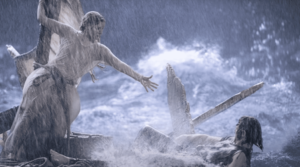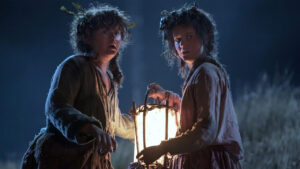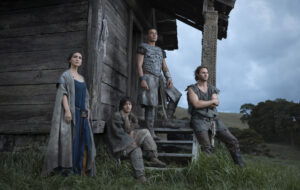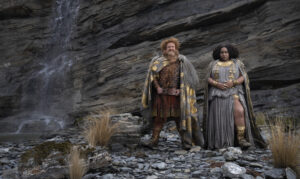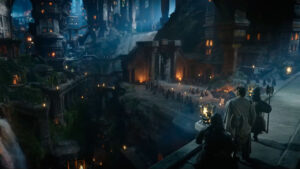MAJOR SPOILERS FOR THE RINGS OF POWER EPISODE THREE AHEAD!
“Then the Edain set sail upon the deep waters, following the Star [of Eärendil]….and saw afar the land that was prepared for them, Andor, the Land of Gift, shimmering in a golden haze. Then they went up out of the sea and found a country fair and fruitful, and they were glad. And they called that land Elenna, which is Starwards; but also Anadûnê, which is Westernesse, Númenórë in the High Eldarin tongue.”
– The Silmarillion: Akallabêth, p. 311
Only the first two episodes of The Rings Of Power were given to critics to review before the series’ release, and now having seen the third episode I believe that was a mistake on Amazon’s part. As was originally reported by TheOneRing.net in July of 2021, the first two episodes back-to-back form a feature-length prologue to The Rings Of Power, which like most prologues puts worldbuilding ahead of plot development – and that in turn led many professional critics to describe the series as slow and dense, which are legitimate criticisms of the first two episodes (though I personally disagree, and would even go so far as to say the first two episodes were fast-paced to a fault). However, the same cannot be said of episode three, which swiftly moves the story along and ends on an excellent cliffhanger that is sure to entice viewers back next week.
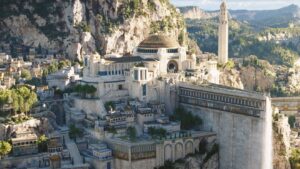
The difference is in the direction. Wayne Che Yip, whom I previously accredited with fixing the early mistakes of Amazon’s The Wheel Of Time in its third episode, does the same for The Rings Of Power, and I hope that at this point he can truly level up as a director, past the point where Amazon only calls him in to put a fantasy series back on the right course after squandering two episodes. Yip brings a dynamism to The Rings Of Power that was absent throughout J.A. Bayona’s episodes, marked by their placid (albeit pleasing) cinematography and minimal stunt choreography. Under Yip’s direction, the camera and the characters are always in motion – even the lengthy dialogue sequences that Bayona rendered dry and lifeless go down easier, because Yip encourages his actors to move about, interacting freely with their environments and one another.
His one fault as a director is his proclivity for slow-motion, an overused effect in action films which can still be used to convey something more meaningful than the impact of a big explosion – but there’s a random quality to the scenes Yip shoots in slow-motion that suggests to me he’s just playing around with the effect to see what it can do for him, and somehow his experimental footage ended up in the final cut. In case it’s not immediately clear what I’m referring to, those bizarre thirty seconds of Galadriel (Morfydd Clark) riding a horse along the beach in slow-motion while grinning from ear-to-pointed-ear like she’s in an equestrian apparel commercial took me all the way out of the episode. I appreciate that we got to see her happy for once, but at what cost?
Slow-motion is generally less jarring when used in the heat of an action sequence, where it can give viewers a much-needed moment to catch their breath and get their bearings – and that is certainly one of its purposes in the climactic action sequence of episode three, although Yip again overdoes it slightly. The skirmish, which pits two Silvan Elves and a handful of disposable human extras against roughly fifteen Orcs and one rabid Warg in broad daylight, isn’t even so complex that slow-motion shots are necessary to help viewers follow along – honestly, as long as you can keep track of Arondir (Ismael Cruz Córdova) and the Warg, no one and nothing else is all that important to the outcome of the fight. It’s still a cool action sequence, however, and the Elven acrobatics are closer to what you’d expect from Peter Jackson’s films if that’s your thing.
But while an action sequence every now and again is a good thing to keep the stakes high, what really stood out to me about Arondir’s subplot in this week’s episode is that it would be right at-home amongst the pages of The Silmarillion, where there are already several stories of stoic Elven heroes forced to endure terrible suffering in captivity at the hands of Orcs, but few so intimate as this one. When ordered to uproot an old tree blocking the path which the Orcs have carved into the barren surface of the Southlands (what will later become known as Mordor), Arondir and his fellow Elves put their lives on the line to save the tree by suggesting they go around it, leading to the unceremonious execution of Arondir’s comrade, Médhor (Augustus Prew). Unwilling to let any more Elves die, Arondir tearfully agrees to fell the tree, but not before first asking for its forgiveness in the Quenya tongue of old. It’s a beautiful, tragic moment based in the deep knowledge that writers Justin Doble and Jason Cahill have of the lore (Doble snuck several Lord Of The Rings references into his writing on Stranger Things).
On the subject of lore, Amazon isn’t allowed to reference anything in The Silmarillion or Tolkien’s other posthumously published works by name unless it appears in The Lord Of The Rings or its appendices, but they can still convey a great deal of information through clever dialogue and subtle visual details, and that’s a loophole Wayne Che Yip, the writers, and production designer Ramsey Avery have taken advantage of at every possible opportunity – in the mixed architectural styles of Númenor, for instance, there are clear signs that the Edain are neglecting and even building over the ruins of Elven towers and citadels as they distance themselves from their immortal kinsfolk. What they’ve preserved are monumental statues of the Maiar responsible for guarding mariners on the open sea, Ossë and Uinen, and of the great mariner Eärendil with a seabird representing his shapeshifting wife Elwing. In Númenor’s Hall of Lore, a tapestry depicts the Star of Eärendil beaming down on the island realm’s first king, Elros, and his twin brother Elrond.
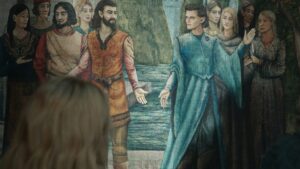
I hate to call these Easter eggs, because that term seems to be used primarily in relation to the Marvel Cinematic Universe these days, but fans of any franchise are much the same: we all get ridiculously excited over the most obscure bits and pieces of lore that only we can explain to our friends and family with the help of an hour-long PowerPoint presentation. The first two episodes of The Rings Of Power, which some critics said were “dense”, didn’t have many of those Easter eggs – probably because the writers and director hoped the show would be more accessible if it weren’t crammed full of references to things beyond their ability to explain. I absolutely get that. But also…I’ve been waiting for this moment.
For more casual viewers, however, this episode may be rather overwhelming as it abandons two major plotlines we followed consistently throughout episodes one and two (both of which ended on cliffhangers last week), while simultaneously introducing the entirely new region of Númenor and not one, not two, not even three or four, but five new characters: a few of whom are predestined to have equal importance to anyone we’ve already met. Not all are treated as such in this episode – for instance, one could easily make the mistake of assuming the character of Pharazôn (Trystan Gravelle), still merely a counsellor to the Queen-Regent, has little to no significance in the overarching story – but be prepared to spend much more time with all these characters, as their story is the overarching story of Middle-earth’s Second Age. They’re not going anywhere.
And what of Númenor, the fabled island kingdom never before seen onscreen? Though nearly every wide-shot of the capital city is comprised entirely of CGI, large sections of the harbor and Court of the Kings were built as practical sets, decorated, furnished, and populated by crowds of actors and extras for weeks on end, giving each space that feeling of being lived-in that made Jackson’s adaptations so revolutionary for the fantasy genre at their time (though he erred, I feel, in designing Minas Tirith as a cold, oversized gray wedding-cake dropped in the middle of nowhere). On street-corners throughout the city, there are craftspeople and merchants representing every one of Númenor’s Guilds, puppet-shows providing the citizenry all the latest dramatized gossip (including a depiction of Galadriel rescuing the Queen-Regent from…Morgoth?), and open-air restaurants serving seafood. The city – indeed, the whole island – is unmistakably alive, and home to a resplendent culture.
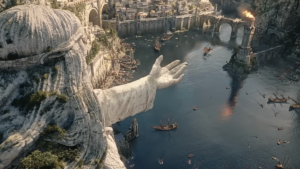
The Númenórean culture created from scratch for The Rings Of Power is built around sea-worship, in what I suspect is a clever example of reverse-engineering (no spoilers, but if you know you know). For aid in actualizing this concept, the production design team and VFX artists have looked first to the seafaring cultures of the Eastern Mediterranean for inspiration. Númenor’s primary architectural influences range from Byzantine to vaguely Babylonian by way of the Greek islands. Its people wear Greek or Italian-Renaissance era garments and hairstyles (well, the extras do), while the royalty make use of nautical patterns, marine gemstones, and jewelry fashioned in the shape of sea-creatures and coral. Its ships have Egyptian or Phoenician silhouettes (although their wing-like sails are very loosely based on those of Chinese junks, with a fantastical twist meant to evoke the wings of Aragorn’s crown).
This is, after all, the land of Aragorn’s distant ancestors; a tall, hardy, and extremely long-lived branch of the human race who fought alongside Elves in the First Age and were rewarded for their sacrifices with the mountainous, many-sided island on which they now isolate themselves from Middle-earth’s troubles – and those of their fellow Men, whom they regard as generally inferior to themselves in every way. Through the character of Halbrand (Charlie Vickers), a Southlander whom we see beaten up, mocked, and derisively called “Low Man” by Númenóreans out looking for a fight, The Rings Of Power tentatively begins to explore this conflict which past adaptations have shied away from, either because it’s too complicated or because it’s uncomfortable to acknowledge that the crimes of Aragorn’s ancestors went far beyond their inability to dispose of the One Ring.
If The Rings Of Power doesn’t abruptly back out of this conversation with its hands in the air, as I still fear it might, the series could provide an entry-point into more challenging discussions around race and racism in Tolkien’s writings – because honestly, these are discussions we need to be having now more than ever. Feigning shock at the very notion that Tolkien’s works contain aspects of racist ideology, as many fans and scholars have in the past few weeks, isn’t how we combat the racists who have adopted the book as some kind of white supremacist myth. At the same time, I understand that many fans (particularly fans of color) want to see fantasy-worlds free of racism and bigotry, so it’s definitely a tricky situation.
On a similar note, the Harfoots in this episode are revealed to have a shockingly grim tradition of ableism in their community. While they get ready to embark on one of their annual migrations across Wilderland, with a procession of kids dressed as wolves and birds-of-prey all chanting the phrase “Nobody goes off-trail! Nobody walks alone!”, Largo Brandyfoot (Dylan Smith) tries to reassure his wife Marigold (Sara Zwangobani) that his broken ankle won’t be a problem for them and their family even though they both know the Harfoots will in fact – without any hesitation whatsoever – leave their weakest members to walk alone at the back of the caravan, where whatever happens to them ceases to be the community’s problem.
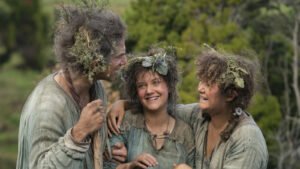
In the final, most horrific stage of this whole charade, Sadoc Burrows (Sir Lenny Henry) recites the names of all the Harfoots who died in the past year, either because they could not keep up – as I assume was the case with one Miles Brightapple, stuck in a mountain-pass…which in turn has me wondering if the Harfoots travel as far south as the Ered Lithui? – or for other terrible reasons, like the landslide that wiped out Poppy Proudfellow (Megan Richards)’s entire family or the wolves that got Daffodil Burrows, whom I assume had personal significance to Sadoc. The Harfoots’ response to tragedy is not to work together, but instead to prioritize the survival of a few while compartmentalizing their grief until it’s safe to mourn.
We see that attitude slowly beginning to change, however, as Elanor Brandyfoot (Markella Kavenagh)’s kindness towards others – which most of the Harfoots see as a weakness that will get her killed – actually results in not one but two friends coming to her rescue: first Poppy, who hangs back to help even though she could easily keep up with the others, and then the mysterious Stranger (Daniel Weyman), who understands, perhaps instinctively, that Elanor is in trouble and needs his help. This should have been the moment where the rest of the Harfoots came back to help too, but they made it abundantly clear that they don’t value friendships the way Elanor and her new found family do. Their loss.
While we’re on the subject, it’s heavily implied throughout this episode that the Stranger is not such a bad guy after all, though he still can’t coherently vocalize his own agenda in Middle-earth or explain why he occasionally murders fireflies, so the possibility remains that he’s not such a good guy, either. Maybe he’s somewhere in between. What is clear is that he’s looking for a particular constellation in the sky (or whatever it is that this constellation represents to him), one that Elanor is not familiar with, and he believes the Harfoots can lead him…somewhere he can see this constellation, possibly? That would presumably require a long journey to lands east and south of Wilderland “where the stars are strange”, according to Aragorn’s reports in the Third Age, but The Rings Of Power did promise to take us to “the furthest reaches of the map”.
If this is the case, and the Harfoots must take the Stranger east or south, it would certainly lend credence to the theory that he is one of the two Blue Wizards, Alatar and Pallando, who were sent to Middle-earth in the Second Age by the Valar to stir up resistance against Sauron behind the front-lines. The only problem with this theory, of course, is that the names of the two Blue Wizards and all the details of their accomplishments can only be found in Unfinished Tales, to which Amazon does not possess the rights…that, and we only saw one meteor streak across the sky in the first episode, although it’s possible the other Wizard was already in Middle-earth, or came from a different direction, or took a different mode of transportation entirely. It’s equally likely that the Stranger is just Gandalf.
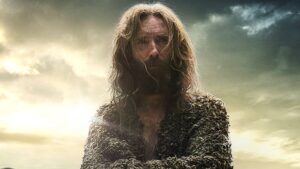
Three episodes into The Rings Of Power, and our burning questions about the Stranger and about Sauron have yet to be answered: though we did find out that Sauron’s mysterious sigil, which he carved into Finrod’s chest and various other surfaces during the First Age, was in fact a highly-stylized map of Mordor meant to guide lost orcs into the embrace of a leader after the downfall of Morgoth. Frankly, I think that raises more questions than it answers (how did Sauron know Morgoth’s downfall was imminent? Why leave a map of his secret headquarters on a body he knew the Elves would take and analyze? Why is his plan only going into effect now, near the end of the Second Age?), but we don’t have time to address any of those questions in this episode.
We do apparently have time for an entirely unrelated mystery subplot involving Isildur (Maxim Baldry), whom we meet as a young man reluctantly training to be in the Númenórean navy, as he hears a voice calling him to the island’s western shores, the homeland of his paternal ancestors; this leads to a weird, vague conversation over dinner between Isildur and his father Elendil (Lloyd Owen) – and Isildur’s sympathetic sister Eärien (Ema Horvath), who has her own interesting journey ahead of her – in which Elendil warns Isildur that “the past is dead” and not to go down the same path as his brother Anárion…who is canonically younger than Isildur, so I’m not entirely sure what is going on here or whether we even need to care yet.
Then there’s a second new mystery subplot, currently unrelated to Sauron and at best only tangentially connected to Isildur and Elendil, one which involves Tar-Míriel (Cynthia Addai-Robinson), Queen-Regent of Númenor, and her father Tar-Palantír – who I believe are conspiring via a literal palantír to assist the Elves and their allies in Númenor. The timeline is being urgently sped up, and the divisions between Elf-friends (who still worship the Valar) and King’s Men (those who worship the divinely-appointed human rulers of Númenor) are already so prominent that Elendil is fearful to even translate his Quenya name, which just means “Lover of the Stars” but was also historically used to mean “Elf-friend”.
If you can believe it, there’s a third new mystery – but this one actually is connected to Sauron. Adar, the Sindarin Elvish word for “Father” from which this episode derives its title, is a word we first hear whispered by the orcs in a reverent tone as they punish their prisoners, and we soon learn that it’s a title by which they address their leader, whom we glimpse at the very end of the episode emerging from the shadows to interrogate Arondir, the only survivor of a failed prison-break that claimed the life of his comrade, Revion (Simon Merrells, very well-cast as an Elf but gone too soon). Adar, whose true name is probably of great lore significance, has long dark hair framing a gaunt, pale face…and if you’re not up-to-date with Rings Of Power leaks, that might be all you know of him just yet, so I’ll say no more for fear of spoiling casual viewers.

That’s where we leave Arondir and the rest of our characters for the week, and that’s where I must now leave you too (unless you want me to start rambling on about my new favorite characters, Poppy and Eärien, because I can and I will if left unchecked), but not before delivering my final verdict. The Rings Of Power‘s third episode is far and away its strongest, boosted effortlessly to the top of my rankings by a balance of high-stakes drama and action, grand spectacle, deep-cut lore for the fans, and heart most crucial of all – and even a dash of romantic chemistry, if you want to interpret Galadriel and Halbrand’s interactions that way. Wayne Che Yip has done it again, but this time on an even bigger scale than with The Wheel Of Time, and I could not be more excited for the episodes ahead of us that he directed.
Episode Rating: 9.5/10
